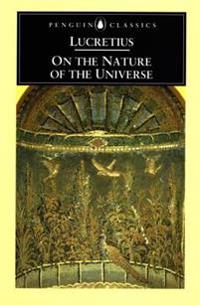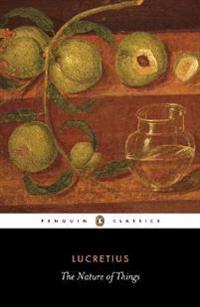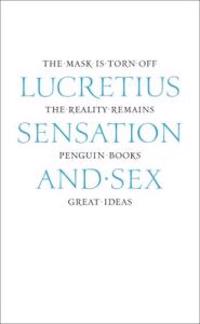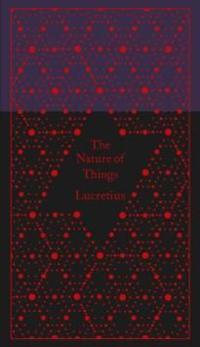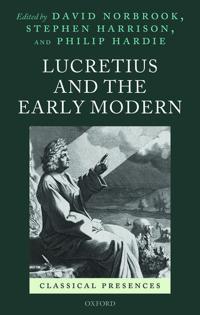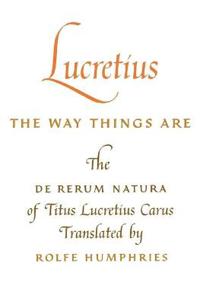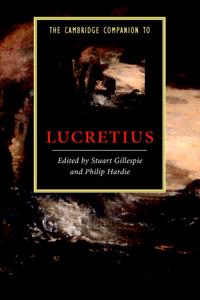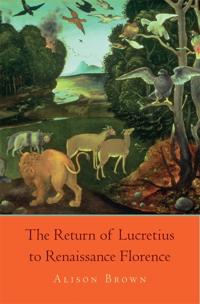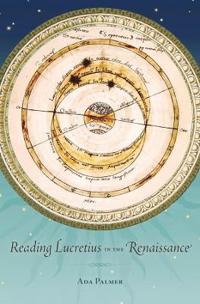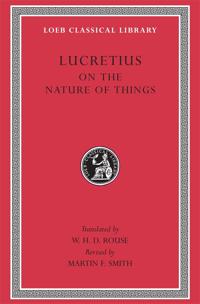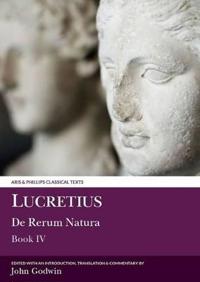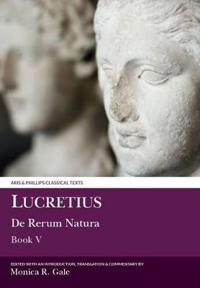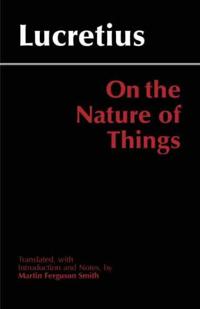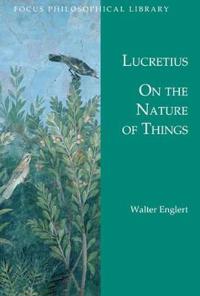Lucretius: de Rerum Natura I (Inbunden)
avLucretius Carus, Titus, Lucretius
ISBN: 9780862920760Lucretius offers his readers a complete guide to happiness and a total tour of the universe. Even a few selections from his poetry reveal the radical freethinker at his very best. This book draws on the latest research into the text and interpretation of Lucretius. It is aimed at the sixth-former or[...]
On the Nature of the Universe (Häftad)
avTitus Lucretius Carus, Lucretius
ISBN: 9780140446104 - UTGIVEN: 1994-12This is a new verse translation of Lucretius's only known work, a didactic poem written in six books of hexameters. Melville's particularly literal translation of the use of metaphor is especially helpful to those looking at the text from a scientific or philosophical point of view.[...]
The Nature of Things (Storpocket)
avTitus Lucretius Carus
ISBN: 9780140447965 - UTGIVEN: 200707Lucretius' poem "On the Nature of Things" combines a scientific and philosophical treatise with some of the greatest poetry ever written. With intense moral fervour he demonstrates to humanity that in death there is nothing to fear since the soul is mortal, and the world and everything in it is gove[...]
Sensation and Sex (Pocket)
avTitus Lucretius Carus
ISBN: 9780141023823 - UTGIVEN: 2005-08Throughout history, some books have changed the world. They have transformed the way we see ourselves - and each other. They have inspired debate, dissent, war and revolution. They have enlightened, outraged, provoked and comforted. They have enriched lives - and destroyed them. Now Penguin brings y[...]
The Nature of Things (Inbunden)
avLucretius, A. E. (TRN) Stallings, Richard (INT) Jenkyns
ISBN: 9780141396903 - UTGIVEN: 2015-04One of a major new Classics series - books that have changed the history of thought, in sumptuous, clothbound hardbacks. Lucretius' poem On the Nature of Things combines a scientific and philosophical treatise with some of the greatest poetry ever written. With intense moral fervour he demonstrates [...]
Lucretius and the Early Modern
ISBN: 9780198713845 - UTGIVEN: 2015-12The rediscovery in the fifteenth century of Lucretius' De rerum natura was a challenge to received ideas. The poem offered a vision of the creation of the universe, the origins and goals of human life, and the formation of the state, all without reference to divine intervention. It has been hailed i[...]
Lucretius on Atomic Motion: A Commentary on "De Rerum Natura 2.1-332": Book two, lines 1-332 (Inbunden)
avDon Fowler
ISBN: 9780199243587 - UTGIVEN: 2002-03-28Poetics of Latin Didactic, The: Lucretius, Vergil, Ovid, Manilius (Inbunden)
avKatharina Volk
ISBN: 9780199245505 - UTGIVEN: 2002-06-27Lucretius on Creation and Evolution: A Commentary on De Rerum Natura Book 5 Lines 772-1104: Book 5 Lines 772-1104 (Inbunden)
avGordon Campbell
ISBN: 9780199263967 - UTGIVEN: 2003-11-20On The Nature Of The Universe (Pocket)
avTitus Lucretius Carus
ISBN: 9780199555147 - UTGIVEN: 2009-02-01This is a new verse translation of Lucretius's only known work, a didactic poem written in six books of hexameters. Melville's particularly literal translation of the use of metaphor is especially helpful to those looking at the text from a scientific or philosophical point of view.[...]
Lucretius the Way Things Are
ISBN: 9780253201256 - UTGIVEN: 1968-01"...[captures] the relentless urgency of Lucretius' didacticism, his passionate conviction and proselytizing fervour.' -The Classical Review[...]
George Santayana's Marginalia: A Critical Selection: Book One: Abell - Lucretius (Övrig)
avGeorge Santayana
ISBN: 9780262016292 - UTGIVEN: 2011-09-02In his essay "Imagination," George Santayana writes, "There are books in which the footnotes, or the comments scrawled by some reader's hand in the margins, may be more interesting than the text." Santayana himself was an inveterate maker of notes in the margins of his books, writing (although neatl[...]
De Rerum Natura (The Nature of Things): A Poetic Translation (Övrig)
avLucretius
ISBN: 9780520255937 - UTGIVEN: 2008-08-06This elegant new translation at last restores the poetry to one of the greatest and most influential poems in the Western tradition. "De Rerum Natura" is Lucretius' majestic elaboration of Greek Epicurean physics and psychology in an epic that unfolds over the course of six books. This sumptuous acc[...]
The Cambridge Companion to Lucretius
ISBN: 9780521612661 - UTGIVEN: 2007-11Lucretius' didactic poem De rerum natura ('On the Nature of Things') is an impassioned and visionary presentation of the materialist philosophy of Epicurus, and one of the most powerful poetic texts of antiquity. After its rediscovery in 1417 it became a controversial and seminal work in successive [...]
The Return of Lucretius to Renaissance Florence (Inbunden)
avAlison Brown
ISBN: 9780674050327 - UTGIVEN: 201004In this first comprehensive study of the effect of Lucretius's De rerum natura on Florentine thought in the Renaissance, Alison Brown demonstrates how Lucretius was used by Florentine thinkers--earlier and more widely than has been supposed--to provide a radical critique of prevailing orthodoxies. T[...]
Reading Lucretius in the Renaissance (Inbunden)
avAda Palmer
ISBN: 9780674725577 - UTGIVEN: 2014-10After its rediscovery in 1417, Lucretius s Epicurean didactic poem "De Rerum Natura" threatened to supply radicals and atheists with the one weapon unbelief had lacked in the Middle Ages: good answers. Scholars could now challenge Christian patterns of thought by employing the theory of atomistic ph[...]
De Rerum Natura (Inbunden)
avTitus Lucretius Carus
ISBN: 9780674992009 - UTGIVEN: 197506Lucretius (Titus Lucretius Carus) lived ca. 99-ca. 55 BCE, but the details of his career are unknown. He is the author of the great didactic poem in hexameters, "De Rerum Natura" ("On the Nature of Things"). In six books compounded of solid reasoning, brilliant imagination, and noble poetry, he expo[...]
Lucretius: De Rerum Natura V (Pocket)
avMonica R. (EDT) Gale
ISBN: 9780856688898 - UTGIVEN: 2009-02On the Nature of Things (Häftad)
avTitus Lucretius Carus
ISBN: 9780872205871 - UTGIVEN: 2001-10Martin Ferguson Smith's work on Lucretius is both well known and highly regarded. However, his 1969 translation of De Rerum Natura -- long out of print -- is virtually unknown. Readers will share our excitement in the discovery of this accurate and fluent prose rendering. For this edition, Professor[...]
The Early Textual History Of Lucretius' De Rerum Natura (Inbunden)
avDavid Butterfield
ISBN: 9781107037458 - UTGIVEN: 2013-09-30Surveys the first millennium in the circulation of Lucretius' De rerum natura, analysing its ancient readers, annotators, scribes and owners.[...]
Introduction To Lucretius (Pocket)
avA. P. Sinker
ISBN: 9781107621183 - UTGIVEN: 2013-08-22This 1907 book provides an overview of Lucretius' philosophical poem 'De rerum natura'.



